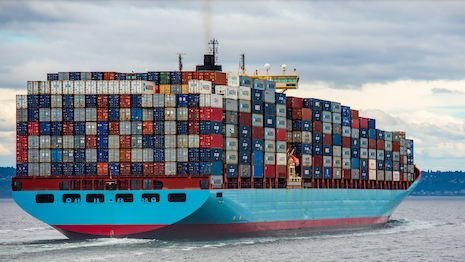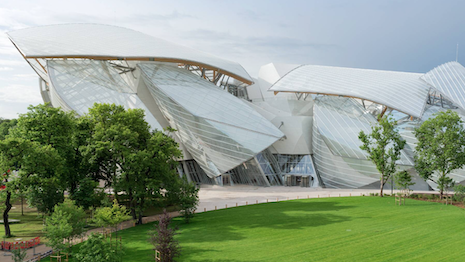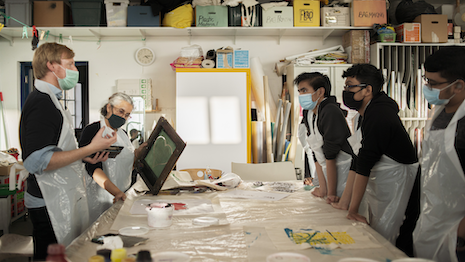The future of sustainability in fashion relies on collaborations and a willingness to experiment with new partnerships across the supply chain.
Luxury fashion continues to grapple the supply chain in all its complexities, including its disruptions, labor ethics, manufacturing processes and more. During a session at the Vogue Business and Google virtual summit “The Way Forward” on Nov. 10, experts discussed how partnerships and ethical practices will help expand sustainability and trust within the fashion sphere.
“Labor should be very expensive,” said Ngozi Okaro, executive director of Custom Collaborative. “Because the only reason that we have these goods is because people make them.”
Collaboration for a better future
Ethics in fashion — regarding both employee practices and the entity of sustainability — have often been in the spotlight. With supply chain disruptions and the looming holiday season, the situation may become more challenging.
 Supply chains are under more stress as bottlenecks buildup. Image credit: USFIA
Supply chains are under more stress as bottlenecks buildup. Image credit: USFIA
Luxury brands and retailers are bracing for continued supply chain disruptions as the holiday shopping season gets underway.
The COVID-19 pandemic has exposed and exacerbated longtime problems in supply chains and logistics. As retail sales climb and bottlenecks build, however, obstacles continue to persist for businesses and consumers alike (see story).
When considering which goods to purchase, whether it is a shirt, car or handbag, many experts urge consumers to remember that these are often results of an employee’s hard work. Without those completing the labor, there would be no luxury product to sell.
This is one reason why brands and retailers must value and encourage their employees, as well as offer them opportunities for growth.
“One of the things that Custom Collaborative is working on is creating pipelines of people who are prepared for work,” Ms. Okaro said. “We have the apprenticeship program, and we’re also developing a program to create more diverse and equitable and inclusive corporate sustainability departments, which is really important as well.”
Several luxury brands continue to identify the need for and importance of apprenticeship programs.
French luxury goods conglomerate LVMH Moët Hennessy Louis Vuitton launched several new initiatives providing access to training and employment for young people from diverse backgrounds. By the end of next year, the group plans to bring in new employees through nearly 5,000 internships or apprenticeships, as well as 2,500 permanent contracts in France (see story).
“We are looking for companies to partner are with us, to put some dollars behind what people have been talking about for the past couple of years — whether it’s race and gender equity or environmental sustainability — they can support Custom Collaborative and the groups like us that are trying to both maintain the planet and create better opportunities for workers,” Ms. Okaro said.
Meaningful partnerships
With advocacy for employees also comes the realization that exploitation of people, places and resources because of the fashion industry must come to a stop.
One way brands can do this is by forming meaningful partnerships and working together towards a more sustainable future.
“The industry needs to be really motivated to [form] longer and broader partnerships,” said Gonçalo Cruz, CEO of PlatformE. “This needs to stop, the finding of the next cheapest region, exploiting all of that for six months, nine months, maybe a year and a half, and then moving on.
“This is highly disrespectful in many ways, and we don’t need to reinvent the wheel, let’s just learn from other industries [that have done this] in the past.”
Leaders in the fashion world must continue expanding beyond the apparel and beauty spheres, while reaching out and willing to be adaptable.
“It's not just Google [that is doing this,] there are lots of other companies that are starting to lean in how they can help,” said Maria McClay, director of fashion and beauty at Google Cloud. “With partnerships, what has been really inspiring is this intersection of technology, engineering, biology, conservation, coming together to help the industry.
“The industry is amazing, but it is one of the biggest industries to have the most negative environmental impact.”
 LVMH and Google Cloud are joining forces in an effort for personalization and innovation. Image credit: LVMH
LVMH and Google Cloud are joining forces in an effort for personalization and innovation. Image credit: LVMH
In June, LVMH partnered with the Google Cloud platform in its latest push for innovation.
The partnership aims to fuel LVMH’s maisons in creating new and personalized consumer experiences that foster long-term growth. It combines both organizations’ creativity, assets, technological capabilities and quest for innovation in their respective markets (see story).
When brands and retailers come together to form partnerships, in the same sector and beyond, there is room to learn from one another in promoting a more sustainable future.
In July, British automaker Bentley Motors and Scottish whisky maker The Macallan celebrated their new partnership with an exciting short film touching on shared mastery and creativity.
The two brands are collaborating to create immersive experiences and initiatives that reflect both classic luxury and innovation. The partnership was announced on July 6 alongside the launch of a new hybrid Bentley, the automaker’s latest iteration of sustainability strides (see story).
“We need to have important partnerships with industries that may not come top of mind, that's how you find 10x ideas, and experimentation is absolutely crucial,” said Google Cloud’s Ms. McClay “Don’t just look for perfection.”
{"ct":"Q7Sm9EoyOTyfSRCdEJkb9ALW+XwCcww2yCDUTRcvT7riliy50iQhPrB7nXmclbCVEb\/SMkauTtnxtJke49IVRAaj1XbyYpxL7GD6mnEoaeq+lc7D1ROmgSA5JAAWTdAzM1edj+zbrMlRLrgkgjBd3hLqJGxOhXfH46O5Ua\/7M12CFoMrZ1bX4wrbmhfpkzjVIQKGcALknti58mTA4ir+tWMx\/zyZgaMzWHou5CHqV1CNoIYoOT4vUM\/Y9bU\/jiwyK5cxZTUEREcFcyyQZC+ayDzYQx1HmFJGfW\/Tai+3sR4ykCtkqEYhGtsnLNhqPgNJ1\/p2dBiEJ1dHtNHPoYhOZBKeMl+zuGg3XH\/pa+GyukfGlvKcV1HvVSUcMsiqGULe5HHqC5Fd2sy70NJ50U9Fbgz6Cbaa0xhfjDdpor2SD4SOA7cb\/qbrTlGoP0Rl+R5nd8NvqcxTUhEJ0TaSRGkMqgq41o92Cf8nDGu0FSMqhXMCEkbNoC2PmFuZM8cG0MCX\/6EiVoNsvpoXYyOzDJP3x5ieakeTFQTOMHFWNALIPr9EqFcT6+SW6uRGNnZ59WxoE2JhhwbqXf07h7bFKXqLnmMdmNaurbimHv46E3pSGimeAKdoH3dRC+WhDirZy5ZQ2yW\/WtUArhpxhPWCwFL0V5z8ZSNm1eRrdY6RnyKBVCduhSlBdutdJDfNxdLNwjGksErGftf7Mx0QT8BZxoLQK9cLqmTcTj\/xIQi4IHBzwSC03+2aA3J1fwl9xAw+RhUy2+o\/hFp29ReAq\/\/ASZ6KBJCKLydEnMF9aEWTBt604\/T7wAOhr+k\/NLZF2dbPE6a6XDcXSQJc1zAyhOY\/gnW3p3VDOLe2D2Mgzma5BBydX7tJ4bwFHDmxBZjEJ5iWfGM\/zec6KtqyEtIEyZXxbeXAcnIJZqTh+E50Tp8mzTJUqu81Y8v6UYAHNGMbvPMGZuu\/88sDgZl\/Uvo\/S84JXusybGzC89peJjEKJKRrAQmd6f5PE10jL28J6Dx+4cB\/ZAqWj4ArFGkUTizH5FVN\/43Ft\/6lRcIkBT2MJw5BECgtDfeRXOa+s6t9ddiiRB5B7mOjBAfn8H3ioxxsziPez2NqJIxPzRjXXza4aXpS167IfDvnghZCfzeF5jSodHxKkplufx3bOAoVprW2jUe6m0GTScupA1QStKrKxlUGgOAxtRMaKImnql59HyfgyQUECngXoW1EASn2S0HfizO6enUe5SQbAoKWfM\/wKZgtU9o7IWuebKzkqvvoF+eMpSuA4Nlt4vs3ygpy8lAPurLLUwQkajVzLALMz5ju3cgXfnuH3XueaJXlq9Ar7ceEnWJsdHt1t3ke7Hcp4AkPp3OHKbWOo0fpmGQrkzhlPi5NbORPywIg4BrROSVxTP9YAkQOCwsUnauJ9I7eJm44yk2r8arcsOjVwncfcgmNzMEYZe3v+jJ62KBsaNAXQxnmvNxniUUjEG+\/1PFsGSWuYgmtfaDEN0SSVHiU1Da\/+h6zESBE9f+2+330SrVDoQlHTnmRctdu5Os+A56fa8Psr5DMrzrWE9K\/k1pp0weuqDRL3FeyL7OFqktpuno2V3RH1N953ggeGx63xyAA8ShDky9Fks8f5GjdVUQIopCGQO14ljMr3npNSOHRFW6+9o5xG9pM1Qwh7j1YJ3jppygsUGKZLR5lPuBjhOS+vf0ctae6qKg7y+QUJ6JY1QhhbNI3M1Zciy7iiu5oBPqcIl3q7Xg8SC6psfIZ7eoSvO\/eCUUA++r13FeItiIdU5BVZR1aqzF\/WhTQH567kgvy8OgUPgr767FfQeqtpSaJu9BGj8kKztgNVIQ0kzGQEk6008ywo8E5oLguzM\/lfoxtXtIfcPbc68DROOsuP\/Wx8MMfnImKxTCh1QI8nJC4pziH+dyPanG3FcbLXvtp707rv+S7FvJGi7Y6TSsOgH90y2crcdpXKARzJt\/X1NUN1AhzDrdmy9BzvNrLnjmc3nCAnyKTruXLcQqb1bd3WWJwv8DNROSPR2M30wK0Uaaf7XN\/ycKMX2xqztzXRkph2\/Wmp8xa6ejOk9UNV3QZWyw7FGcLPZqbgfVf4yBL9SmfLbClP6b9I0lFklPUCG6q501OtO3BGritbuLtb\/nFGsNL9nfKHNDfkXembpM6dQMGqFMKe8MvYKkP67eGV65Q8H+LKYreQYPyNAzZiXHeiA6z3Ui36uLCZwxE4wW44CZ1WqsgPjc9Wg1Sa5N9J9xmZrbBtOPfOrIOsiU\/CwjwAQjPmtcjuAnqoKlVKwQ\/cLiXaZOf+oK7uLmsDERKsXTrHYYWKNsuvHsWylQjFQ43Af81EYm1IoCuLdNiCNEUZIAL+7vQ4iztyhzYaF+8sv9Vqjt22pelY13zdj07XrF+oOfWRgR+\/jFT9rIHSxuHjPOHhONvHDxzesyuSncjcGHURE+Arjgi+emFIrzBH19\/2XGNqOcXk1yXpYMuQl\/CclEJHh2CpdJHq\/rOLn9vV0Zdoe\/LVwAzH0MlviZszg9o\/zSEdDJnngedyRRzm7fqEzYw5i\/jEuh2KJE2rGjEmCcKyRUnNg9p5UHNfEoK1nI\/D1Nc6AT8eb78xpeM+07BiI8qzEbga\/cs4BxlRIzly\/cs\/AfqgD83aSHwdy8Vq0usej5nEcOfIQRDGVa0Z15yS+rZFg+m24r13x0PKfPVJI+aPqofkcIxdxOojvabGvugBY7fM0cPJ+SbPIk8SsCKGAG1HzAShgL+kmSCTSvEB0P6FFobK8zKxZiOjJ4S6AhPceD\/ZkBRLuC+9oohy6pJIjtVzcdzsYbz0Hn5MX9rloUmZ6pr2B3qv2\/w3yoqKWfqSkUcQtz\/25rXgfy90J7s5dOu\/efIWZYjaMzHqZkRaoR\/bIpnbEpExuCX9IoxHVh2gzBuqveRlMv\/8zs4g7WLRn\/Pt4xcQOrS6J53Tq06rGl1SAeTBvwQcT3uZLzvtt3ra1hl52CyPtkqGsm3SX1bRdTqXDWSXtRIU672WKKLGmtwf78Y8aTySib8ofgGpytMVtjDaUNAfgtDEY7ktYCkOcMBHDAn8i8PGg3ZhOzTQBfk4NU4fYheTAfb1No84mIVs8fjlBR67cnEW01MYqm2QGb5wCWFbzyVGS8s5Q+NVBE10UwU7ymlV+RD9MLb9r6TSCU6e16Bi6sDlZOZedpqUIjtBDrcrMglG7zjekYWRX5YskpwDuFeRRfCb\/39j8QwUtc29RKfNSD+QMW+wGREqEV1nqJ2F1BUcBFkPvPcVftpLAK4tethtu\/\/Hj6B0dZrx00wszWGHWa7wJak5sovdNDDyR2fs9nc+aVc6lcAyPtXc7+teuCKIul6pTwEqs\/ffpRdVNQ8EkD7sIv17uybqQylxeVV5zLCsz4vicWUsYy6uasq+gy8mdf7UQsrkAE1xTNtG45OoSzBsCt2fVGcg\/zlVIBs54BpGthd\/5osC1qXMohCwAnxNyz6i8YUa5QU1xw\/D\/dgOYLehYvOwb5+52MSGhy1D+H1NTZHWAmu2+DQ4TuPleZ2HkaBohbPfUCGRf9eHG9mzafCnz\/jQXiWAMKuD5a5dG5znfvhU9RNoM2TY7jMfAanxaJRQOfRS5JvkH3+IWUvixODJ301ulwq0kY9MfoK5WZUVKsCAbDCxQ9ozsX7VsH6Z5u+0Ql3r\/mLFn4lOhy+1g2FAYkonsGM52sDyMwZxP2iA6mVsHxNO7FcC7+p1cor9DprTc4gjRaF9CPpZhlwehjdQwQqpzjlJFqbOoy+4MFAyLF230EZ+YmQjru+JOI72AAcPzdsTgws7OQL\/AHXAeU3H5AdtBnHF0I5+avmQyp3PIkGrkQ6fPhtBCquxyTpAi4kZM2F6dQ5zk3ccaQQIVxL1XYX6grV+vqYGz8rHIggKjlgTp1n3b4K6Hhfdj\/gdKk7CxwFFwVI6n6UKJS\/tA6iNBjvBe7uyohsnbL00PtGAkkE0zNuzVoH5vGoiemyDdhsoFoMTvNPOzilz26p36Bf\/FYLXdTJcSDlIMyVJbcWbuIpQrtVE3oEmndd\/+LbI\/04naqiwU8SVeA1VVW3irlwRSAdVGO63h5DbjBOCRumRYRswioP8Wjitxtpxhiur3c2unj8wxTMjje+hX3+ZFu81y3OFBo2RVeMduhqjZnXLOL\/70okHy5p6TWCG51\/ljrdUJex2ctvJbhWw1CwLgrAIyEADDbtnQ47rOaZdh+aQWhylnNwJNXDCgTS6E23tbr9me6RTsJoPi+QgjwI0DfRCoQbLLQegbIENZFLn5XvMDHI3Y\/eQdZ86wMFRqhZilqxm+ddnQT8FBSmd8cKXihixVZ8YcHKWXdY8n4+S0EZO4Z\/7bHD+XtLM5BoBUAs+Nb2AHVU4KSWn1n0\/lRbMReaGh56cm8qum\/Ka\/5ISl8GjH5saTOobMt9xv1ed\/IffShwVsN298xDAQw46mVfxiTSCl0yhTWDS0OexlbeDPdEEnHh5vIDORydeFFezFm+lYSbtF\/js9RxUGEdBxLLzsOPIFJ1jURSr5uRkdobA18ncJZVR3GVHuxOpRhdbs749FYtFHSgZbOmAFKVkGlQxXUDgXu8d+EUT7TGSZRqCicKiE885AlMtBhmFrSg+pnG96EUAk\/F5jTFucwvW0SPDvSON++4X3Hf0bg3BMkkkostTKW44cAR1l23Ve7SNoJMp+j1clE9TzwjCJAolGC3t9mPW+h\/w3rF7WjtridjeqDjNCojphLFLEq9JksYMgfmncyLHoznHaNzcqkdD0mikMOhkgNBb28ByaUnm+OjJAAbWSuVw5SliWa7WfUfzmtPJsxoJ4wLhIiqx29LFgFNoY9KFp5F3Rs7iH3xGBUbPQivoclssr5Jr4SJgYsFAzgc6qPhwZkuDu05ROAjtb38MWWBOrIkOSQOyGdhZeKfGw1UMnsbmgpOfBpT5IGZpv+LPju7JJqa16OKinLzurncOcsSLbAjPqjV\/TxjR3P\/bVvfpBAbG+E9IjO5Pq9PlhP28kDGIznsOaBTDRw133zzS50hX\/jp+6bTUd52e9f+7gJRsJ\/Z1fTgRSsFNkyu2zMmWEtjcqDwgVJfOOqb9kSXATvAz48HbxRzavQjzBhonf4ojaPixBi3JVB03h2Dqq1nZBbIQzQ2wlE9o5gBgiEpTkbNDGhDyyjy7AAp1ILxXWJlzk8XC\/tovHcfs2a\/i7YFJCk9DPqPXZJNB3teFNyKk+3T4PjnL2lXcm4pSKBmyhBdAHyWrITlsglumsv8vGnhmp1ro4FLqUrCmuCpXhR5tbYq6wegKwzhKnIuIMRcg4UrxwRd9Tn\/La0wiqF1PD9tNuYj\/H+nKP1h9MHoep52iGQfCkGUQDeXEfyhUMqX7kkGt2AFLbhm3bfVgnVlbNuAXdtMe0MsVr34RjZHUX1ruU9k9or\/x9TxTzpURqYX9ofYiLTGMQtkraNmaCGBoaK9revxntomtgjL7nEHTz1GIdzBdbonQDgJdn1mHtYAxvZR6UvVkWAVAM3sz8U8yO+29+lCum+30koXHS59kQ12UL0+8wbve3uNeDclwnR1AMvFVGraFyYJYHKqTNJGiKTorwNfVZ5NpbQSPgqFd3ZfwF3oIEXL3d71CvRTT5+dbJpmS2rkHfSXRMtQFQW3kBYErovyK1CpjdwWipxh7EcaWwpSDrMyZB0JndaRZJyWpMWfHxDd1CSYoVP2wtVzh1Nqh1ftvkEJMprWtUeVjocYT+FUSbAAEo9Yhp3ogCIFaQgsu1XghX48bt90I6M2LckHRXopGPf3fg85WkdlRBQhIoQo4GATrpyDbG5TC1owpJHWCVPO+7c3zv10Xt9GSN\/znUyCirR7OoDEIqCvy+Ojv2BoMLWLCXokqTX9yUDjjxNns3LMlEC7pqvz6Bt0tgitHD8ZWQS1Rn03S+tv4xZCkfyZNDxVdxkQ\/7jv\/eIhyHnKx\/s3r2SC2+FX9Y2+V1CeO7yinTSxAz\/qcDZ3PURh1LzSItSDPixYVWSs9PuxP98wN1TReWHh0tkTIBn5EZbbgJuPfnnZ\/2\/DMbDJKbyNAypWvfLMmW8xQTo1\/DzS0E78L2h2mXW+R90lwc2lzNucj0SqWQlSqDB3paCqFeNeFQA5EdFP2XHIKPVnhGITM1+rc5OiBZC6Kgx8p2+MgK2+MgIyHLnzNEpviHxxeQKGmaHoiUwHXi4iKLhMWKGeC6Q1b9ZiYQbSQ6GOBF1HZ9XyY+p\/4DRMj73\/kS8rYDFok\/jOISYkbRFdL38R5luyzq3510zDP\/d0nfg8YSag\/x3Ik6p4lMVatdMjzsqS6IHDCj7COez4YBs64KbbE1dAWaB4BzN3Opm73e89mTtldwFT+SaUW3703xOnMFF9plWromgqq7bKU5IH843\/W5AB\/S4\/dCC+eI7heL32sd\/Jb7urlp0knuzaIE7pXJa4eWYbfV0qZgbiBq\/c7A6rF5YO0ExT\/dFc+NPOQ4Z+RSBUHstgVZ4dt58JY6RKRTaZ1dKBaSxyYiDI\/i5kg4ICuV9iBX5AYwrlkhAoqsNYoO4EU3j73sLY3fShRLNhLq\/vHG1ld19lsEPGUYVTnvRxdcTS+Bm8j7QNmoJlYnt17Ar3TLqkZukFW67j7Ony6RR9BoMIcLPcJ\/kMLY7BeE6chJD1oDbxi6SeMyjoWY\/Wrvvj2XfX6p6AblglcTPQIKQv69cwj31ercQ0cKAmqticD8+W2HGtWlr8K5K3d94ZMdaggOmaeAQNtG6pahX1qAvamGRyEPtLLTCJ8NID0vBRgxwjG2hnbjq86usQQacqMZ1FHMnPkwQ6MSNp1At2lkXKqqHkpqLgOMLgBcMaX1yblswoPjpEh48lw0kdfcHuO40Y4xpZldsgDuEtlZ+m8vwfTUOPX8sp5htkHT5f19bEex9mFq5a6Wo1zryZWdfBaS+IqIpbpj6X+1\/nu5ptqqRCXqvPMCwJRZVdGn\/XPG6q6my57IKQ9Dlg4S5RwzFxUWrupL\/0\/3ttgmn9cpPBxWnenjBli68Y67wteO0VPPP1r8Iss\/CefBheBJ9WifYvhCaayJYa6hBJpRMG62xf\/Crug9jse0In\/bgxMZ+NB0shpHoQ42qO9\/Fxks6DndOE0KAyj68M1Cm3yvSonzW7bcswUTY61lyyAFZi5OrSIoA\/mMS74suxx61UQJ4wcICexJcOKLRAa4HC38kHs8Nbq033owJyRnlvaJ3ykpYYnqiXdEJO8DZqDMVBn6hCa0XnzWjutG0hMp2zX+NO\/l80779SjY9GZLwr40gUPbRApXdcPd9fovNE2TUzRdugcKrFy9RyH2KzbKrZvuYgSE9N51iUNHeF495gIno63AsV55yR7dIGYLZ44EhEXO0VxCUlUqGY+771Iu2sF\/CcdTo82IfKT6JuCOx5+gzdsjZDIm9rTfIN6tHI\/Q8wtk6ek5zAr1IOutj91biv+dPDlu7SHeJ\/pJAZPS8CjTkRT+ULyWrwiLGQVM\/cKh6GykWNylPCA3JUvoT2FUrvXe8mmuWxxbQp4B1bZmb9Xnjd\/+aBx2uuZIXrat6yLULHv62khBwkFmaSEhrLWs5PYZUQ3crPVcxjxC4ogmQNEBdcQ+awc1oAokLJW+jH2Y4jJZ4QSRDaYDWYoE+a6ogrrbimQuJm5BOJSUzGYl85DGmKFJdFjc\/7By7UiibFXEAOcBks6rwGiCUaDJYDVjs3j\/RG3Vm1Z3s0w5jQGQk0ARPOLknjCNnNN94dzhZ+vFiRLmSkKGrpGHLKhwg427+mnK\/276aAdELpwGbTnIjOcFuRE9CgKYo3KCIac6XJT7K\/PrCVieVaO1yVs12MsrDdWY0XdQS0qWe0aQkaptK4vCAgbSSQPnxhSFqeUOAOFsYsCxbjV+Nj4zRrfydsI2H6gdm+oAPCFeOMtxcfdqeA7ul2YzFXocQxfwa0vqpUNaGV+9Z2jlupRxwgXNynidtWkc9N34ZRhKSM7PEZoiEv1x7N7vtiSCf2VjdTwXZd\/dv+qevqnGoWO78j6DescF+adKiQ2AeWll1aGpHpneOm9R4NNzhPsizbc9QJwmNJRjMW1hxyr5XvbnNGNCjC0co3r4Q8YWlNi\/\/OZn3m6sN3WwobbATcCVkg1iAVZ8f5RCiKoa3LeRP5WylX7wJJqth2m+AJxM1YalBJCImtTHb1NcUHwC0TdNxFM4OG05h8EOjCNBTR8v4AmVKjvA52cu1ZsLr9Fn\/CtAKzXlRqY+Ucj7U9rkfg9vlLWS\/vjyRe1lG4betW3erIhKohLjcqgWzQQh5SKjifbbOWVvjxWFj17omyIIA4BYSNgq6DvYyUjznV7gfeKKRz8II4IxjD38Chab21qlm6+phGd6ty5CAXKYm6KJtIalQpGHa+ocS0eKL8KzBgLQWh\/hr3L8yEkViK0c4gsaK6D895\/PhlUlvyv8eWmjbXOPxgttlTE7rE8JyBLMuBE7TsB0qzQiBP+iRHnqimjwdFrhCjjLUUDRSZbq5BlXZQQ6ztoDMhPAo9l5rmf+FBG1vdSml4K4rWdpe50lUOb\/FjlEfSmXWBlMvJHkgk\/Hb4C1x8ByKIdgykJ8ElFIYjqQWvQzMQuGNBHnKAdwHu5GOwW5dvEZ94Jp8+kY34Qd\/rqAh04XVU3fRDFePn+V5dtTxjbLguFmutz\/aW64T\/l\/RLRTCIfuaObd0Eqeb9xNJCahNIuWtLHjxDD6xS7npEJE\/v6qGWpIObUgYa9S2lbaOCh87NDiemdZZ\/rsJeUL1zocTTqmbD6HQ4+jYnfr8oGKJ1\/GGJhy7RXkuvqX2bF8DfOJqUGW1XP4k0U5EM\/ZZ51AZPpcBIv7+OBRw5xy\/iyVYL91kdT963uFP\/XKhNJZpXlI5qmQjngfxuG+dnDUTNsGb7nJ\/tJMBeMcCPMAeNopnDMlHvbDa827PjkcJZZtZgOFms6lNGTdQ9soDDJF+02gfPdU0ZgiWYFeypJqmPRgv94X4RVBtElNWfV6X2L6rxJY1Qy3ue\/rf4IZI++uBQMLY3GTUoIP6zTPBLbj4C0eY1hMmCACnCfp3QDNtrJ5j+XkFUYDJbnX1XrMuY0dn+LhErKuuyX4sbDgU+aYcR\/7XHPWycHRRx1kaxp1+60vvoaAbU8t8iodiysbVRUr5HWegyMbEGsdIw7bFxuiCoj4owFrGyFVJvVL\/47sPAKM\/LSWnmLm7\/uH\/TDkm6IIOkhnMyPizBiQu74qT4UWbf4\/be24nNbkm00pqtY3ffjS+MyBvJPt0uDHVQya2fEhMFqkkO2BPaGNYv0zY6YWYCFyuIDrAKbLFKubD7\/Xuk3qnxfgXeNm+RMULtwyznl1c+9Lpv0r39CsYKUPr9GhHK\/tE\/\/enDAza1N4V4Q5gYwO\/p9weuuK1Qsl5Nb2bT1ONI5v6sxASHDdwT0UdJAmOpjzlI317LaJCOSfxlmra8nRoAYIJc\/ysQZ0N0GQtPhEfB9Mnkc5JE2gXztB+ZlvFPCsKalrAzw8iK50YeeeaCGmU1KKrz9340WLDyq49j+x4IZHrwThqss+LwrKvjhC1dZihYEgcQeyUWi8SGwvxeeiu+EZSEQTurkMcp1VSKBpP2yKcvj8L\/a1fMewvjeU\/hio1DokH9VGOUVrFbLD5wxPPd7OqALMI0doGGEy0evEzpqLHfWpx8zMq6xpyG2G9x0vZxMr9fF6kNz4XJwsgzIPlv7tWoQhc0SNVOOcsGuKnud8cp2zNNahAP6MDvoWuMCzLPh\/Cf3ouwkLwYAF0uksPFQ9yuDT72E9Fq3q1ZHakiF+CXH7b0d5A36n6tbShPlIB5tTfxsTTz3kZQlZVSivmJh2ZOL7KO0ukhasHyUx0gHEPdhycaS0UZQjdgOCqLDLnN\/6jX2BHOGLHyr7RWFaL6HabDaOT2avEUdeMOi05tgcWBw5T4Lup0Ut1hkVP1dwKDebFXT6OLmFY6Mx3j9d68+yQ8FtW71TI1KbUZyxSPYp92mGP2A6mt7x3rA97Fw1+2+HaAtazAVGqg23pERGKQgJZ6XqB0u2W9RDzpM6DjFnkLyiffPbawjdXGWEMD+m6ODtgmVAWNMnvltw3k5NTBZ99jEdsR0HkQtUrueVqq8o0PVhLhV6SwKKUULEK+ydVxdaAH9v4jETkZ1OyUnZi0vcCTP8Haz+lwgjSkCg9dJIh1TdZYipz7YaUGSTV08\/+GmP\/hDidMGW3cB0rY0+ak+9exDS0osv43bPFliIDxmma1uH03avfB1wZoTKGPmMSus6NyYFCY6KmC6T1500TUHKfBEOq+DlEpYjjPk8Y14XroU9pjL70QAriDHeBiMs7l6LEKOJL\/THVimM6wdlCwi+wG9y3NlBu86l60CEbsXBbXgU0NW5kUdAFEYqmFrfa+\/QotNWwErE+fjnFiZ95zy1wch7JceIh50pXHZ8J\/U2LfRl24FIN0syiKlTwH8G7UmumkAS51KJt8wnNOgOKq0su0JA4Hzq59M7HvHDkZJucOLNAvL0FMYDmlJiXxf4tT5OJ0fV3WombJUXTLliP0aKZJcOk5IucavIBzEKybfhAfNvY9q+BWLn72SgtLZ7n56oh7CDVLbPp6hZXfL2OIQxJASqCVHv8ohB3xUQk83jnm9OtVW9AMURWEKN1B\/1sY3jMbStYu4sShVRV99IE+hTWxqWt4ou2kwtT4XWhVeW4tCdECmv1OMXKJyCI5","iv":"ff81457d27b8fb263428d23d992e50a4","s":"4064f807c21a299d"}

 Alexander McQueen is supporting a more diverse workforce with a new educational program. Image courtesy of Alexander McQueen
Alexander McQueen is supporting a more diverse workforce with a new educational program. Image courtesy of Alexander McQueen  Supply chains are under more stress as bottlenecks buildup. Image credit: USFIA
Supply chains are under more stress as bottlenecks buildup. Image credit: USFIA LVMH and Google Cloud are joining forces in an effort for personalization and innovation. Image credit: LVMH
LVMH and Google Cloud are joining forces in an effort for personalization and innovation. Image credit: LVMH